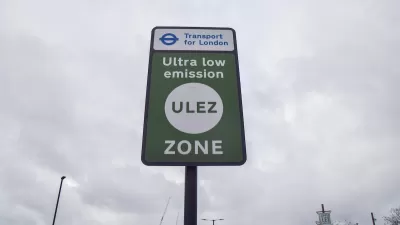According to new research, London's congestion pricing program has improved traffic safety both in the cordoned city center and in the free adjacent areas. Although traffic is moving faster, fatalities have been reduced.
"Research to be presented at the Royal Economic Society’s annual conference later this month found that traffic accidents have fallen in the capital by an astonishing 40% since 2003," writes Jamie Doward of The Guardian. "The work is the first study of its kind and is likely to be examined closely by other cities that have flirted with the idea of imposing a similar charge."
According to the program's website, the daily charge is "£11.50 for driving a vehicle within the charging zone between 07:00 and 18:00, Monday to Friday," which equates to $16.96.
The crash reduction was matched by similar reductions in traffic fatalities and injuries and "extended beyond the congestion charge boundaries into adjacent areas, as fewer people drove through them to reach the centre." The improvement in traffic safety is not self-evident, as "(w)ith fewer cars on the roads in central London, motorists can go faster," notes Doward.
This could have increased the risk of accidents. However, the research team led by Professor Colin Green of the economics department at Lancaster University found that the charge has instead resulted in a substantial reduction in the number of accidents and fewer fatalities.
Bicycling Safety Impacts
There had been concerns that the charge would lead to more people cycling into central London, with a corresponding increase in accidents. The report’s authors found that this was the case initially. Accidents involving cyclists rose at a rate of roughly 1.5 per month until 2005. However, by the end of 2006 this had reversed, and cycling accidents and fatalities fell.
Doward ends the article by asking Professor Green's opinion what the research may say about the city of Manchester "which voted against introducing a charge" in December 2008.
“Would Manchester have seen this effect? My suspicion is yes,” Green said.
FULL STORY: Congestion charge has led to dramatic fall in accidents in London

Maui's Vacation Rental Debate Turns Ugly
Verbal attacks, misinformation campaigns and fistfights plague a high-stakes debate to convert thousands of vacation rentals into long-term housing.

Planetizen Federal Action Tracker
A weekly monitor of how Trump’s orders and actions are impacting planners and planning in America.

In Urban Planning, AI Prompting Could be the New Design Thinking
Creativity has long been key to great urban design. What if we see AI as our new creative partner?

Baker Creek Pavilion: Blending Nature and Architecture in Knoxville
Knoxville’s urban wilderness planning initiative unveils the "Baker Creek Pavilion" to increase the city's access to green spaces.

Pedestrian Deaths Drop, Remain Twice as High as in 2009
Fatalities declined by 4 percent in 2024, but the U.S. is still nowhere close to ‘Vision Zero.’

King County Supportive Housing Program Offers Hope for Unhoused Residents
The county is taking a ‘Housing First’ approach that prioritizes getting people into housing, then offering wraparound supportive services.
Urban Design for Planners 1: Software Tools
This six-course series explores essential urban design concepts using open source software and equips planners with the tools they need to participate fully in the urban design process.
Planning for Universal Design
Learn the tools for implementing Universal Design in planning regulations.
planning NEXT
Appalachian Highlands Housing Partners
Mpact (founded as Rail~Volution)
City of Camden Redevelopment Agency
City of Astoria
City of Portland
City of Laramie




























